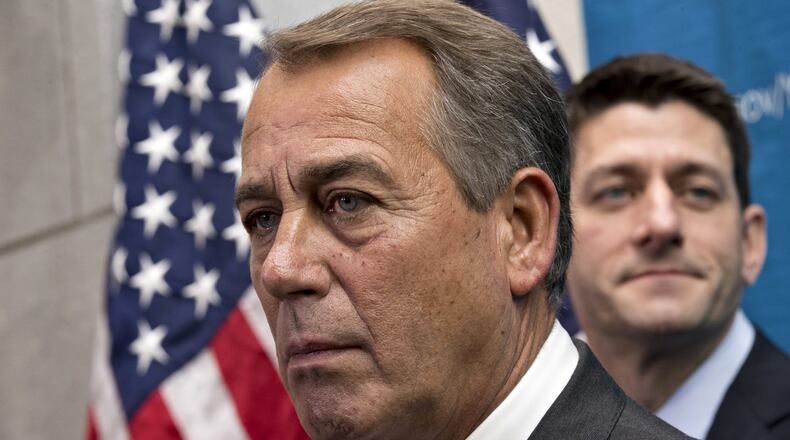Unmatched political coverage
Our team in Washington brings you the latest news you need on politics, government spending and military affairs. Follow us on Twitter at @Ohio_Politics.
A budget proposal that could pass the House as soon as today would roll back the mandatory budget cuts that could put as many as 6,000 jobs at Wright-Patterson Air Force Base at risk next year.
The plan, reached by House and Senate Budget Committee Chairs Paul Ryan, R-Wisc., and Patty Murray, D-Wash., respectively, late Tuesday, would eliminate $45 billion in mandatory, across-the-board cuts to discretionary spending in 2014 and an additional $18 billion in those cuts in 2015, calling that “sequester relief.”
Those cuts would be offset by savings elsewhere, including by making new federal workers contribute more to their pensions and trimming cost-of-living adjustments for younger military retirees. The agreement would reduce the deficit by about $23 billion.
The budget wouldn’t restore discretionary spending to what it was prior to sequestration, but agencies wouldn’t face the sweeping, across-the-board cuts that they faced under sequestration, and would have greater flexibility to impose the cuts in the least damaging way, said Rep. Mike Turner, R-Dayton, who voted against the cuts in 2011.
“This provides the Department of Defense with budgetary certainty and ends the indiscriminate, irrational sequester cuts that were debilitating the Department (of Defense) and resulting in significant furloughs at Wright-Patterson Air Force Base,” he said.
He said the overall budget numbers will be lower, but “removes from the Department of Defense for two years the punitive effects of sequester.”
Turner was one of a handful of Ohio lawmakers to openly embrace the budget plan, which is hoped to pass into law by the end of this week.
Rep. Steve Chabot, R-Cincinnati, meanwhile said he had yet to make a decision on whether to support the deal. “I’m reserving my judgment,” he said, saying he planned to read the bill first.
Rep. Jim Jordan, R-Urbana, said he would vote no because the deal violated an agreement the Republican caucus had made to not get rid of the sequester unless it could achieve the same level of savings in mandatory spending programs such as Medicare and Social Security. The Murray-Ryan deal, he said, “was a marked departure from what we all set out to do.”
Jordan shared sentiments expressed by outside groups including Heritage Action and the Club for Growth, which assailed the plan for not doing enough to cut the deficit.
Their opposition sparked a rare moment of pique from House Speaker John Boehner, R-West Chester Twp., who teed off on the groups Wednesday, saying they were "using our members and using the American people for their own goals."
“This is ridiculous,” he said, adding that some groups critiqued the agreement before an agreement had even been reached.
Hours before the deal was announced late Tuesday afternoon, Heritage Action sent out a statement saying it “cannot support a budget deal that would increase spending in the near-term for promises of woefully inadequate long-term reductions.”
Club for Growth President Chris Chocola, meanwhile, said the plan “swaps debt reduction today and next year for the promise of debt reduction a decade from now.”
After Boehner’s comments on outside groups, Chocola said the organization stands with “every other fiscal conservative who opposes the Ryan-Murray deal.” He said the group didn’t weigh in on the deal until it was complete.
Jordan, meanwhile, said the groups had little sway over his vote.
“I’m going to vote how I’m going to vote,” he said. “I don’t get all tied up in that.”
Boehner has had a sometimes-tumultuous relationship with conservative advocacy organizations. The groups earlier this year thwarted a Boehner push to open the shuttered government through Dec. 15th and raise the debt ceiling through Feb. 7, saying the plan did nothing to stop President Obama’s health care law. Ultimately, Senate leadership struck a deal to reopen the government.
Former U.S. Rep. David Hobson, R-Springfield, said the groups have made it harder for Republicans to both win elections – because they face primary challenges if they don’t do their bidding – as well as to govern.
“I think they have made it more difficult to enter into reasonable negotiations, because no matter what (Boehner) does, unless you win it all, it’s not going to be good enough for these people,” he said.
On Wednesday, Boehner gave little doubt to what he thought of the budget deal - and gave a clear dig at the groups who opposed it.
“If you’re for more deficit reduction, you’re for this agreement,” he said.
About the Author
